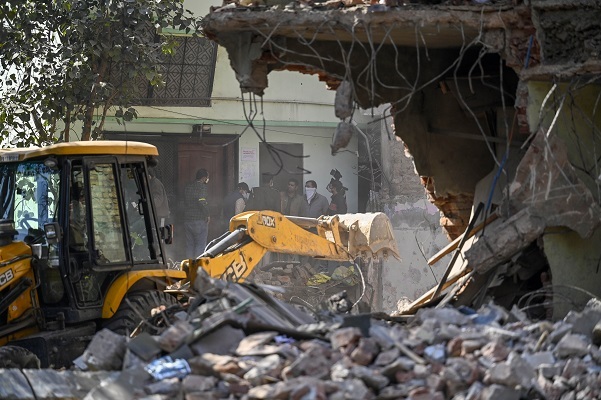India Top Court Suspends Demolition Drives Targeting Muslims

The court, which is reviewing several petitions challenging the campaign, has instructed the government to pause the demolitions until the next hearing in October, AFP reported on Tuesday.
Prime Minister Narendra Modi's government has frequently used bulldozers and earthmovers to demolish properties of those facing trial, claiming it targets illegal constructions and serves as a strong response to criminal activity. However, in a recent hearing, the court stated that this practice amounts to "running a bulldozer over the laws of the land."
"Alleged involvement in crime is no ground for the demolition of a property," the judges emphasized.
Human rights organizations have condemned the demolitions as an unlawful form of collective punishment, usually targeting India's minority Muslim community.
Read More:
Justice Bhushan Ramkrishna Gavai, one of the three judges hearing the case, remarked, "It can't be demolished even if he's a convict... the demolition can be carried out (only) as per the procedure in accordance with the law."
The campaign began in 2017 in Uttar Pradesh, governed by Yogi Adityanath, a prominent Hindu monk and a key figure in the ruling Bharatiya Janata Party (BJP). It has since expanded to several other BJP-controlled states.
Officials maintain that the demolitions are legal, targeting only buildings constructed without proper approval. However, affected individuals argue that their properties are not illegal and that they are not given adequate notice to contest the demolition orders.
Amnesty International has described the demolitions as part of a selective and "vicious" crackdown on Indian Muslims who have spoken out.
Meanwhile, human rights groups have alleged that the mistreatment of Muslims has increased under Prime Minister Narendra Modi, who took over as prime minister in 2014.
Read More:
Since then, the country has seen a rising number of attacks against Muslims and their livelihoods. Reports of hate speech have also grown.
Cases of mob lynching under the pretext of protecting cows, considered holy by some Hindus, have increased during Modi’s time in power, and homes and properties have been demolished.
In March, the Indian government announced rules to implement the Citizenship Amendment Act – a controversial law which opens the way to Indian citizenship for non-Muslim refugees from neighbouring countries.
Read More:
It declared that Hindus, Parsis, Sikhs, Buddhists, Jains and Christians who fled to Hindu-majority India from mainly Muslim Afghanistan, Bangladesh and Pakistan before December 31, 2014, were eligible for citizenship.
The law was declared “anti-Muslim” by several rights groups for keeping the community out of its ambit, raising questions over the secular character of the world’s largest democracy.
Source: Agencies



